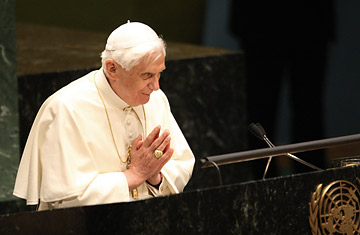
Pope Benedict XVI addresses the United Nations.
When Benedict XVI arrived at the U.N. to deliver a much anticipated speech, diplomats took out their camera phones and snapped photos. But anyone expecting the Pope to pull off the Fisherman's shoe and bang the lectern, as Nikita Khrushchev did in United Nations legend, was disappointed. As is becoming typical of Benedict XVI's American visit — in which impromptu remarks to the press aboard his plane and during a private meeting with sex-abuse victims have routinely outshown speeches previously billed as "important" — the Pope talk at the U.N., billed as "watershed," was somewhat low-key.
Various hints and rumors suggested that Benedict's talk would feature (depending on who was hinting) strong statements on (a) the Iraq war, (b) the role of religion in combating terrorism, (c) immigration, (d) the environment or (e) all of the above. Yet when Benedict arrived by car at East 42nd Street after his flight from Washington and a helicopter ride from Kennedy Airport to Manhattan, he had very little to say about any of those hot-button topics. Instead, he presented a carefully composed case — rendered somewhat exotic by the fact that he delivered the first part of it in French and the second in English — for the importance of the U.N. and what he considers the unsung religious basis of its goals.
It almost seems as though Benedict has decided on a kind of sprung rhythm for this trip, where big, unexpected gestures that make headlines today alternate with more subdued lectures that may educate us in his subtleties long after he is back in Rome. The U.N. speech would be one of the latter.
Benedict started out with a slightly hedged compliment, noting that the U.N. has established "universal objectives which, even if they do not coincide with the total common good of the human family, undoubtedly represent a fundamental part of that good." Presumably the caveat was a reference to bodies like the U.N. Population Fund, which encourages birth control. But the Pope made it clear that he stood wholly behind the organization's goals of "justice, respect for human dignity, humanitarian cooperation and assistance." Pursuing those aims, he said, was all the more important since they have by now become the multinational consensus, yet are ignored by any number of nations.
There were moments during the speech when Benedict seemed to take oblique aim at both America's involvement in Iraq and at the Bush Administration's tendency toward unilateralism and habitual belittling of the U.N. He stressed the "requirement of all international leaders to act jointly" and then turned one of the Administration's most famous phrases in support of the war back on it, saying that "What is needed is a deeper search for ways of preempting and managing conflicts by exploring every possible diplomatic avenue." Note the linking of the words "preempting and "diplomatic."
But the bulk of his talk was devoted to lauding the U.N. and, more specifically, the Universal Declaration of Human Rights it adopted three years after its founding, whose 60th anniversary was one of the official reasons for the Papal trip. The Pontiff observed approvingly that human rights are "increasingly being presented as the common language and ethical substratum of the modern world." He argued that the true impetus to human rights, rather than just the utilitarian instinct to achieve the greatest good for the greatest number of people, was a "natural law inscribed on the human heart" by God, a standard Catholic formulation. Refusing to recognize this divine origin, he warned, deprives rights of their absolute and universal application, which in turn cedes the field to his old foe, "a relativistic conception" according to which "rights could vary and their universality would be denied in the name of different cultural, political, social or even religious outlooks."
Benedict revisited a couple of other favorite themes. One was the true meaning of freedom and truth, which he understands only in the context of morals and faith. Thus, although he underlined another favorite theme — that religion should not be an official part of government, on either the national or international level — he refused to acknowledge that there might come a moment when the pursuit of either scientific progress or human rights could ever be at odds with true faith. For instance, in talking about the ethical challenges of developing technology, he maintained that regulations on research "never require a choice to be made between science and ethics: rather, it is a question of adopting a scientific method that is truly respectful of human imperatives."
